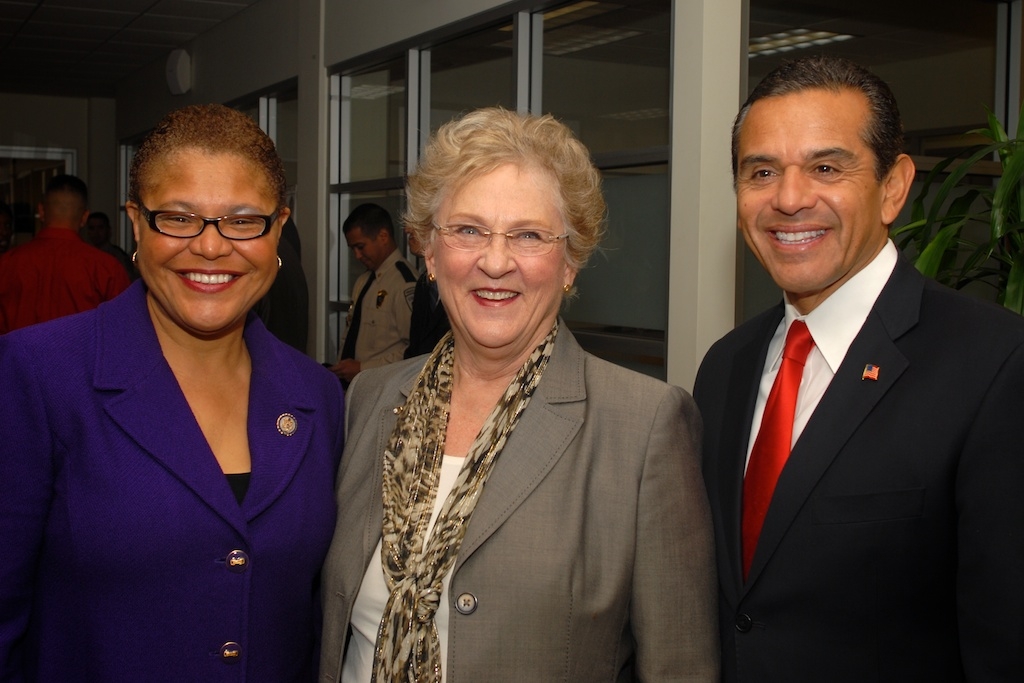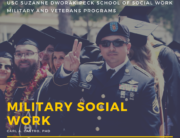by Maya Meinert
At a gathering at the USC School of Social Work of government officials, including Los Angeles Mayor Antonio Villaraigosa, military veterans and representatives of organizations that serve them, a female veteran stood up and recounted the difficulties she encountered when she returned home from two tours of duty in Iraq.
Though she excelled in college – double majoring in international studies and Spanish – she couldn’t find a job. Then she received a letter informing her that it was time to start repaying her student loans. She had $2 left in her bank account.
“I looked at my bank statement, and I said, ‘These $2 aren’t going to get me down,’” the former medical corps member said though tears.
She found a veterans social service program that helped her find a job, but many veterans – especially those with post-traumatic stress disorder and other mental health issues – haven’t been so fortunate.
The event, which was hosted Nov. 9 by Mayor Villaraigosa, and congresswomen Rep. Karen Bass and Rep. Linda Sanchez, and co-sponsored by the USC Center for Innovation and Research on Veterans and Military Families, tackled the issue of budget cuts affecting social services that cater to veterans and what can be done to alleviate the problem while promoting reintegration.
There are about 8,000 homeless veterans in Los Angeles County, many of whom return from deployment with PTSD – “a normal reaction to an abnormal situation,” said Marilyn Flynn, dean of the School of Social Work.
Villaraigosa noted that federal budget cuts to job training and other social service programs disproportionately affect veterans.
“On Veterans Day, when I stand up and acknowledge veterans, I need to do it with a straight face, not a two-face,” he said. “We need to invest in them.”
While there are numerous local agencies that serve veterans, including peer counseling program Vet to Vet, the United States Veterans’ Artists Alliance, and homeless shelter Weingart Center Association – all of which were represented at the event – veterans are having trouble navigating these services. Many expressed frustration at not knowing about or how to access these programs.
After listening to veterans talk about the difficulties they have encountered while trying to assimilate back into U.S. society, especially when it comes to finding jobs, Villaraigosa promised to institute a preferential hiring program at the Los Angeles County Metropolitan Transit Authority, much like ones already in place at other local unions, and establish a Yellow Ribbon Program in Los Angeles that will inform veterans within six months of returning of the services available to them. He also said he would form a working veterans advisory committee to tackle the issue of high unemployment.
Dean Flynn noted that while government services are improving at a significant rate, there is still more that needs to be done. That’s why three years ago, the school established the Center for Innovation and Research on Veterans and Military Families, with the purpose of improving and expanding the workforce of mental health professionals serving the military-connected community through training, and conducting research and policy analysis on how to best promote reintegration. The center is the first of its kind to be based in a major civilian research university. The school also offers a master’s degree with a specialization in military social work, which Rep. Bass noted is one-of-a-kind.
In response to the need for higher employment rates among veterans, Anthony Hassan, director of CIR, recently attended the Clinton Global Initiative America jobs summit, a meeting hosted by former President Bill Clinton on driving job creation and economic growth in the United States. Hassan was a member of the Veterans Working Group, which addressed the soaring unemployment rate among veterans and developed strategies to lower unemployment among new veterans by educating employers and equipping returning servicemembers with critical tools for success.
CIR is also starting its own initiative, Building Capacity in Behavioral Healthcare for Veterans, which will provide free training to healthcare providers through its military behavioral health continuing education series over the next year. CIR’s commitment to offer training at no cost is designed to quickly boost the number of mental health professionals who are prepared to effectively treat behavioral health challenges among military-impacted populations.
Hannah Stryker, a second-year MSW student studying mental health and military social work, also feels it is important to educate both employers and veterans to help mitigate high unemployment. The Reserve Officer Training Corps (ROTC) cadet, who attended Mayor Villaraigosa’s Veterans Dialogue event, was heartened after hearing the mayor and congresswomen Bass and Sanchez speak about working to resolve veterans’ issues.
“It’s amazingly important that our local government cares. It’s one thing to read about an initiative or hear about a bill, but it’s another to see your local congressmembers who really care, and not just on Veterans Day or Memorial Day, but it’s in their passion, in what they do,” she said.
However, Stryker, who will be a commissioned social worker in the U.S. Army when she graduates, also expressed concern when it came to actually getting veterans jobs.
“I will have a job when I graduate from this program, but for so many of my [veteran] peers, what will be there for them when they [leave the service]?” Stryker said. “There is a lot more that needs to be done. For example, the veterans advisory committee is a great idea, but I want to see it happen. I hope this will lead to action.”
PHOTO: Rep. Karen Bass, Dean Marilyn Flynn and Mayor Antonio Villaraigosa at Veterans Dialogue event








